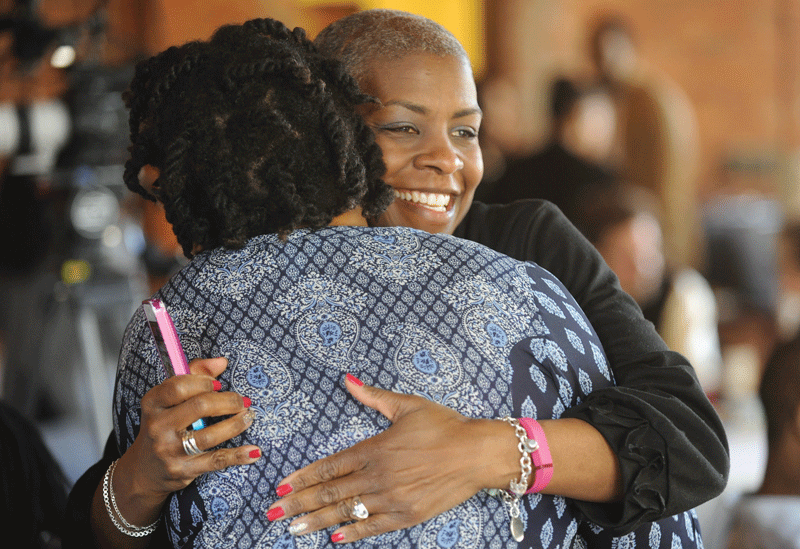AAAVC Triennial 2015: Reflections on Activism
On the weekend of April 11, the African American Alumnae/i of Vassar College (AAAVC) celebrated Triennial XI, welcoming nearly 80 alumnae/i, family, and friends back to campus. The event also celebrated AAAVC’s 30th anniversary. The theme, Activism through the Ages, offered an opportunity for African American alumnae/i to reflect on the founding of the group, inspired by a spirit of activism, and on the efforts made by black alumnae/i over three decades to positively impact the experiences of students on campus.
Most alumnae/i have heard about the events of October 30, 1969, when 34 African American students occupied Main Building to protest the paucity of black faculty members at Vassar (there was one, at that point), the lack of representation of African and African American peoples in the curriculum, and the lack of a Black Studies department. A year after the sit-in, the committee presented the Caitlin Report, spearheaded by Sally Caitlin, then a member of the Vassar Board of Trustees, recommending the creation of Black Studies (now the Africana Studies program), the appointment of a nucleus of qualified full-time Black Studies faculty members, and the founding of an African American cultural center in Poughkeepsie.
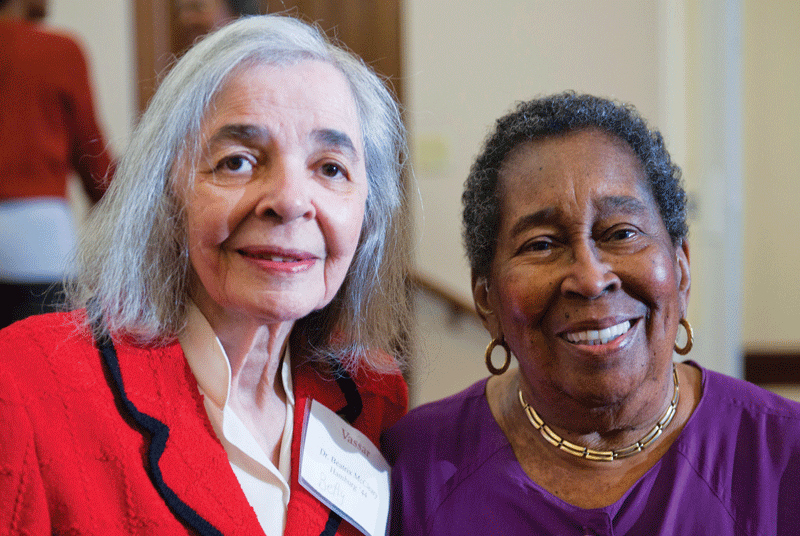
Another well-known takeover of Main Building followed in 1990, resulting in the establishment of what is now the ALANA Center, the reintroduction of the Baccalaureate Service, the establishment of the Kente Cloth Ceremony, and the creation of the Council of Black Seniors.
The story of how AAAVC was formed is far less dramatic and remains lesser known. In 1983, veterans of the 1969 Main Takeover, such as Claudia Thomas ’71 and other interested alumnae/i, participated in a joint venture with the college to increase diversity in the area of admissions, to bolster career networking for undergraduates, to improve the quality of student life on campus, and to help recruit and retain minority faculty.
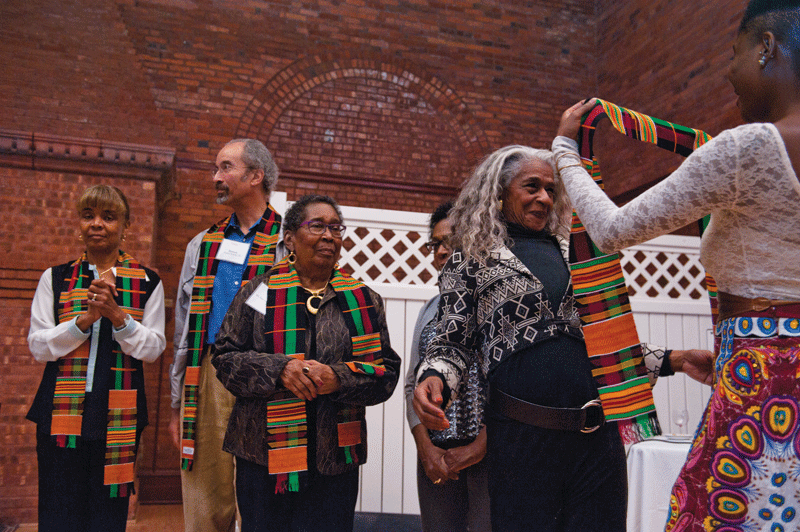
The group gave their recommendations to the Alumnae and Alumni of Vassar College (AAVC) board at its June 1984 meeting. It was then that AAAVC was formed and became a functioning affiliate group of the AAVC. Since that time, AAAVC has been active in uniting alumnae and alumni of African descent and keeping them “visible, vocal, and involved.”
Kenneth Miles ’07, an AAVC trustee to the Vassar Board of Trustees who also has served as co-chair of AAAVC, says “those same initiatives remain strategic priorities today.”
Most recently, with guidance from Miles and AAAVC co-chair Karen Roberts Turner ’86, AAAVC spearheaded a campaign to raise awareness about racial profiling on campus and contributed recommendations for the college to consider as it works to address issues of racial profiling and bias. The organization’s leadership has been meeting regularly with President Hill, members of the Vassar Board of Trustees, and the AAVC Board of Directors and continues to be an ongoing voice of advocacy.

For its decades of service to the college, the AAAVC was presented with the AAVC 2015 Outstanding Service to Vassar award during Triennial.
At this year’s Triennial, there was lots of catching up and fun activities, such as a talent show organized by the Council of Black Seniors on Friday night and a dinner and dance on Saturday night, but the focus was on reflecting upon and paying homage to the pioneering efforts of those who have led the way. Throughout the weekend, black alumnae/i spoke formally and informally of their experiences at Vassar. In attendance were two of the first self-identified black alumnae/i to graduate from Vassar—Dr. Beatrix McCleary Hamburg ’44 and Dr. June Jackson Christmas ’45-4. AAAVC dedicated Triennial XI in honor of these two “pioneers.”
An interview with Christmas after Saturday morning breakfast was a centerpiece of Triennial. The professor emeritus of behavioral science at the City University of New York was interviewed by Joshunda Sanders ’00 about what it was like to attend in the 1940s.
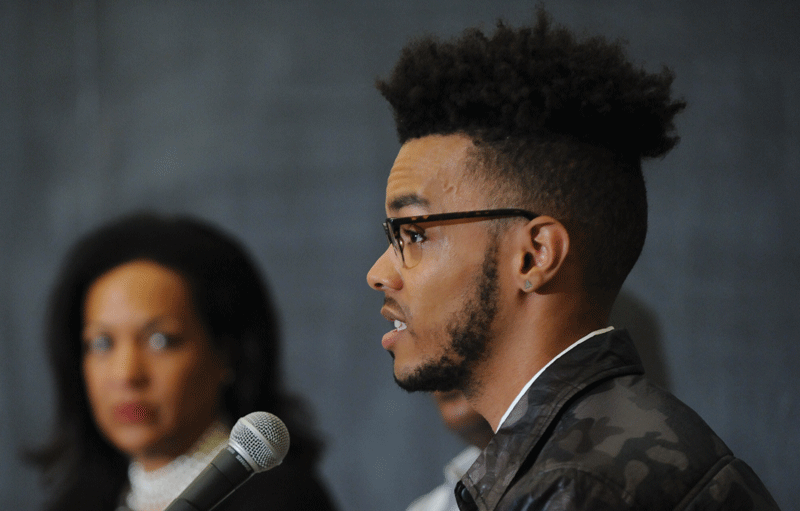
“It was a wonderful experience, and it was occasionally a trying one,” said Christmas, noting that she and the two other black students—McCleary (Hamburg) and Camille Cottrell (Espeut) ’45-4—spent a lot of time answering questions of students who had not encountered many black people. It was only later that Christmas heard there might have been resistance on the part of her fellow students. “One girl told me recently that she’s ashamed to admit that when I was assigned to sit next to her at a meal—the only place where we were assigned tables—that she was very upset and told her family that she did want to sit next to a Negro,” said Christmas. “I didn’t get much of that, really. I got a wonderful, stimulating intellectual experience, which is what I wanted.”
Later in the day, alumnae/i across generations spoke on a panel moderated by Jasmine Harris-LaMothe ’05. The panel started with an account of the takeover of Main Building in 1960. Maybelle Taylor Bennett ’70, who had taken part in the occupation, talked about “riding the wave of [activism]” that was happening in the rest of the country and said their protests concerned not just what was happening on campus, but what was happening in the community surrounding Vassar.
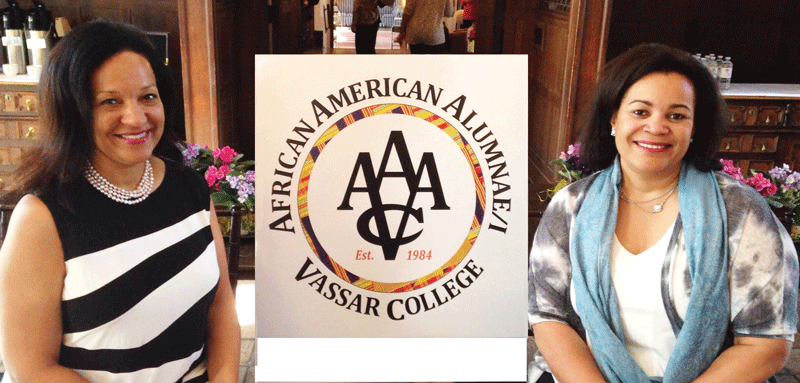
Richard Roberts ’74, now a federal court judge for the U.S. District Court in the District of Columbia, was among the first class of men admitted to Vassar. He remembered his Vassar days as “a time and place of significant intellectual and political growth for me. That occurred, in part, because of the first director of Africana Studies, Milfred Fierce. He held us to very high standards. He also was the house fellow for Kendrick [then a residence for black students] and started the Paul Robeson Study Group to raise political awareness.”
Roberts recalled a protest in which several classmates refused to wear caps and gowns for graduation, objecting to a mandate to buy them even though the price was prohibitive to some; they instead wore African garb.
Karen Clopton ’80 read a series of highlights in the style of a performance piece, detailing the challenges faced by black students on campus and in the surrounding region.
Cleon Edwards ’90 first discovered Vassar via the Exploring Transfer program, which introduces students from community colleges to a range of four-year colleges and universities and offers encouragement to apply. He said the program, which takes place over the summer, “gave me a chance to define the space differently than I would have if I’d been thrown right into the mix.” In effect, he got to see the campus as “his” rather than feeling “different” among the larger population of students.
Kleaver Cruz ’11 said: “I went to a great [high] school in Massachusetts with idealistic students, similar to Vassar, so I loved being here.” It was seeing how some of his friends were struggling that made him realize his own privilege, he said. His activist mode was to work “within the system.” With Associate Professor of Political Science Zachariah Mampilly and others, he helped to start Transitions, a program designed to help low-income and first-generation college students adjust to life at Vassar.
Turner, who has co-chaired AAAVC for more than six years with Miles, says the theme of the panel was an important one. AAAVC, she says, “has focused a great deal of time and energy over the past several years in activist mode. These efforts often turn our recollections to past movements and protests led by students then. These stories are not often told. We wanted to acknowledge the historical role black alums have played in changing Vassar and to reaffirm our commitment to remain very vocal and present in ensuring that progress continues to move us forward.”
Miles notes that conversations around race and class at a national level “have all underscored the importance and significance of being mindful of how we work together collaboratively to bring awareness to and present solutions for these challenges being faced within our campus community and beyond.” An important question, he says, is: What role can AAAVC play in that evolution?
Though Turner and Miles will remain involved in AAAVC, they formally turned over the reins to two new co-chairs during Triennial. Clopton and April Riley Robbins ’85 will now lead the group.
As AAAVC welcomes its new crop of leaders, Miles says he feels “gratitude in knowing that we stand on the shoulders of giants—our predecessors and ancestors who came before us in doing this work. There’s still work to be done, and there’s an important role for AAAVC in that process.”

